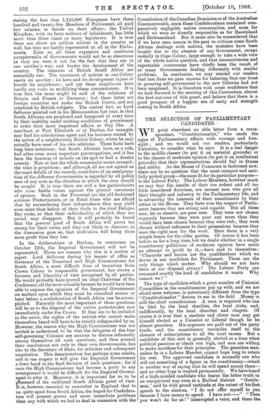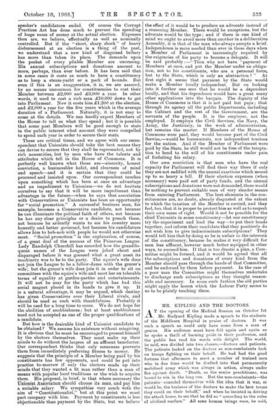THE SELECTION OF PARLIAMENTARY CANDIDATES.
WE print elsewhere an able letter from a corre- spondent, " Constitutionalist," who reads the signs of Parliamentary affairs with courage and fore, sight ; and we would ask our readers, particularly Unionists, to consider what he says. It is a real danger to the middle classes (to put it on material grounds) or to the classes of moderate opinion (to put it on intellectual grounds) that their representatives should fail in fitness and ability. As the House of Commons is fashioned now, there can be no question that the most compact and care- fully picked group—the most fit for its particular purpose— is the Labour Party. The Labour Members, however much we may fear the results of their too ardent and all too little considered doctrines, are earnest men who give all their thought and industry to the Parliamentary life, and to advancing the interests of their constituents by their action in the House. They have won the respect of Parlia- ment because, they are strong and capable. But all these men, let us observe, are poor men. They were not chosen expressly because they were poor any more than they would have been chosen because they were rich ; they were chosen without reference to their possessions because they were the right men for the work. Here there is a very simple lesson for the older parties. Of course it has been before us for a long time, but we doubt whether in a single constituency politicians of moderate opinion have made an attempt to profit by it,—have said to themselves : " Character and brains are the qualifications which we desire in our candidate for Parliament. These are the only things which matter. Why should we not have them at our disposal always ? The Labour Party can command exactly the kind of candidates it wants. Why cannot we ? "
The type of candidate which a great number of Unionist Committees in the constituencies put up with, and we are afraid even welcome, is notoriously different from the type. "Constitutionalist " desires to see in the field. Money is still the chief consideration. A man is required who can be bled by the local charities, the local clubs, and, indifferently, by the local churches and chapels. Of course it is true that a resolute and clever man may get himself elected as a Unionist or Liberal though be be almost penniless. His expenses are paid out of the party funds, and the constituency reconciles itself to the absence of subscriptions to all the local causes. But a candidate of this sort is generally elected at a time when political passions or ideals run high, and men are willing to make sacrifices for their principles. The penniless man, unless he is a Labour Member, cannot hope long to retain, his seat. The approved candidate is normally one who will cut something of a figure in the constituency—which is another way of saying that he will spend money there— and no other type is wanted permanently. We have heard of a high-minded candidate who learnt the bitter truth in an unequivocal way even in a Radical district. " Gentle- men," said he with proud rectitude at the outset of his first, speech to the electors, " I do not offer myself to you because I have money to spend. I have not—" " Then you won't do for us ! " interrupted a voice, and there the speaker's candidature ended. Of course the Corrupt Practices Act has done much to prevent the spending of huge sums of money at the actual election. Expenses then are, we believe, effectually as well as nominally controlled. But if the " short, sharp shock " of heavy disbursement at an election is a thing of the past, we understand that a new kind of disguised bribery has more than taken its place. The demands upon the pocket of every pliable Member are unceasing. His annual subscriptions and donations amount to more, perhaps, than ever before. It has been said that in some cases it costs as much to have a constituency as to keep a steam-yacht or a pack of hounds. But even if this is an exaggeration, it is, we are assured, by no means uncommon for constituencies to cost their Member between £2,000 and £3,000 a year. In other words, it used to cost a rich man £10,000 down to get into Parliament. Now it costs him £1,200 at the election, and £2,000 a year for the five years which is the average duration of a Parliament. Naturally, it is not easy to come at the details. We can hardly expect Members of the House to tell us what they spend ; but it is possible that some past Members will be good enough to state in the public interest what amount they were compelled to spend each year in order to secure their seats.
These are critical times, and we agree with our corre- spondent that Unionists should take the best means they can devise to secure that they shall be represented, not by rich nonentities, but by men who have the talents and attributes which tell in the House of Commons. It is perfectly well known what these are—sincerity, honest conviction, a businesslike habit, and clearness of mind and speech—and it is certain that they could be procured and insisted upon. Our correspondent touches upon something which has been at once an advantage and an impediment to Unionism—we do not hesitate ourselves to say that it will be more impediment than advantage in the future—when he says that association with Conservatives or Unionists has been an opportunity for " social promotion." A successful business man, for example, becomes a Conservative candidate, not because he can illuminate the political faith of others, not because he has any clear principles or a desire to preach them, not because he ardently wants to see his country more honestly and better governed, but because his candidature allows him to hob-nob with people he would not otherwise meet. " Social promotion " is the explanation, of course, of a great deal of the success of the Primrose League. Lady Randolph Churchill has recorded how the grandilo- quent names of the League were joked about and disparaged before it was guessed what a great asset its machinery was to be to the party. The squire's wife does not join the League to be a fellow-dame with the grocer's wife; but the grocer's wife does join it in order to sit on committees with the squire's wife and meet her on tolerable terms of equality at garden-parties and entertainments. It will not be easy for the party which has had this social magnet placed in its hands to give it up. It is a natural advantage, it may be argued, which destiny has given Conservatives over their Liberal rivals, and should be used as such with thankfulness. Probably it will be used for a long time to come. We do not hope for the abolition of snobbishness; but at least snobbishness need not be accepted as one of the proper qualifications of a. candidate.
But how is the desirable kind of Unionist candidate to be obtained ? We assume his existence without misgiving. It is obvious that he must be encouraged to present himself by the electors themselves. They must make up their minds to do without the largess of an affluent benefactor. Our correspondent thinks that only meanness prevents them from immediately preferring fitness to money. He suggests that the principle of a Member being paid by his constituents has few opponents, and could be put into practice to-morrow if only the electors made up their minds that they wanted a fit man rather than a man of means with popular local traditions or the wish to acquire them. His proposal, in brief, is that where necessary the Unionist Association should choose its man, and pay him a suitable salary. We sympathise very much with the aim of " Constitutionalist," but at this point we must part company with him. Payment by constituents is less objectionable than payment by the State, but we believe the effect of it would be to produce an advocate instead of a reasoning Member. There would be exceptions, but the advocate would be the type ; and if there is one kind of mind we ought to avoid more than another in a deliberative Assembly, it is that of the man who always accepts a. brief. Independence is more needed than ever in these days when a Member of Parliament is increasingly required by the exigencies of his party to become a delegate. It will be said probably :—" Then why not have payment of Members' at once, and put the Member under an obliga- tion, not to his constituents, who are a personal force, but to the State, which is only an abstraction ? " At first sight it seems that payment by the State would make a Member locally independent. But on looking into it further one sees that he would be a dependent locally, and that his dependence would have a great many other applications into the bargain. The dignity of the House of Commons is that it is not paid but pays ; that through its agency all the public Departments, including the Cabinet and the rest of the Government, are the servants of the people. It is the employer, not the employed. It employs the Civil Services, the Navy, the Army, the Justiciary, in the work of administration, but remains the master. If Members of the House of Commons were paid, they would become part of the Civil Service,—would be bureaucrats, not independent trustees for the nation. And if the Member of Parliament were paid by the State, he still would not be free of the tempta- tion to bend to the will of his constituents under pain of forfeiting his salary.
Our own conviction is that men who have the real capacity for Parliament will fiud their way there if only they are not saddled with the annual exactions which mount up to so heavy a bill. If their election expenses (when necessary) were paid out of party funds, and the annual subscriptions and donations were not demanded, there would be nothing to prevent suitable men of very slender means from entering Parliament. The best elements in the con- stituencies are, no doubt, already disgusted at the extent to which the taxation of the Member is carried, and they feel, too, that it is proper to protect him as well as to respect their own sense of right. Would it not be possible for the chief Unionists in some constituency—let one constituency try the experiment and lead the way—to put their heads together, and inform their candidate that they positively do not wish him to give indiscriminate subscriptions? They would tell him that by doing so he is unfair to the interests of the constituency, because he makes it very difficult for men less affluent, however much better equipped in other ways, to succeed him. If that is too drastic a plan, a Com- mittee might be formed, and it would be agreed that all the subscriptions and donations of every kind from the Member should pass through the hands of that Committee, and be endorsed by them before payment. In the case of a poor man the Committee might themselves undertake to discharge such subscriptions as they thought reason- able and necessary. In some such fashion the old parties might apply the lesson which the Labour Party seems to us to be plainly teaching them.















































 Previous page
Previous page